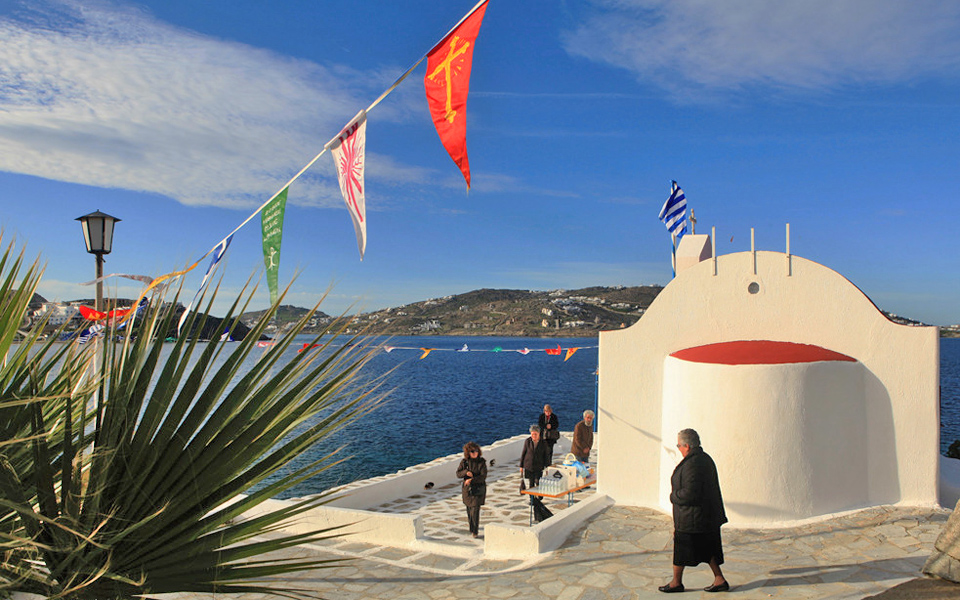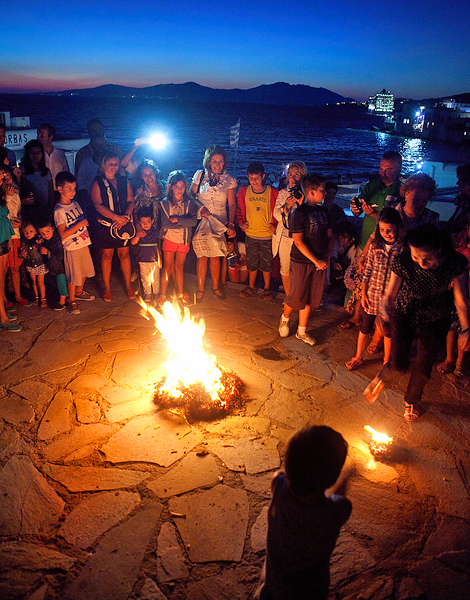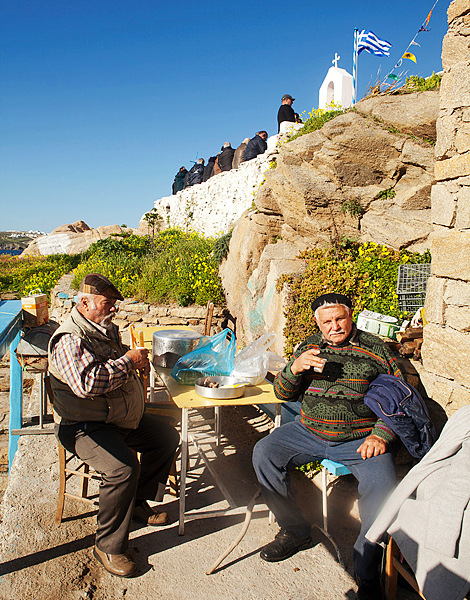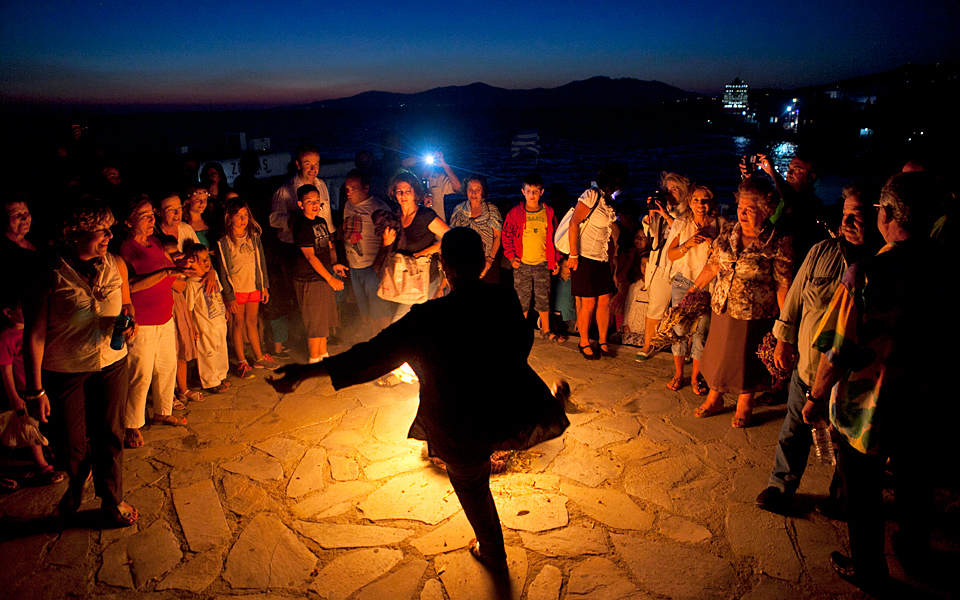Despite the sweeping societal changes brought about by the island’s frontline position in the Greek tourism boom, the Mykonians – like Greeks all around the country – continue to cherish their traditions and their communal identity, both of which are indelibly linked to their faith. One of the best ways to see how this works is at a church fair, or paniyiri, which is not just a celebration of an important religious occasion, but also an opportunity to strengthen community spirit and its bonds with the past.
Dimitra Sikiniotou-Nazou, a local researcher of folk traditions, explains the background of the paniyiri and how this institution has evolved. “The island’s livelihood used to depend on the sea, and the construction of a new church, along with its annual paniyiri, was a votive offering made by sailors,” she explains. “They would vow to a particular saint to build a church in his or her name and to hold a fair every year in their honor in exchange for their beneficence. At these churches, they would pray for successful journeys and a safe return to their island. Even after Mykonos began depending on tourism rather than maritime commerce and fishing, the fairs remained much the same, an offering by locals asking for good health, good business or whatever other protection one asks from one’s saint.”
There are around 600 churches in Mykonos today, and each will hold a paniyiri, big or small, on the day their namesake is celebrated. These fairs are usually organized by a few families who are responsible for looking after the particular church. Friends and neighbors will pitch in, donating money or time, to ensure that the fair is a success. Putting such an event together is no easy task, and preparations can begin as much as a month earlier. On the eve of the saint’s day, the church will be freshly whitewashed and decked out in the flags of the nation and the Greek Orthodox Church.
“Even after Mykonos began depending on tourism rather than maritime commerce and fishing, the fairs remained much the same, an offering by locals asking for good health, good business or whatever other protection one asks from one’s saint.”

© Katy Fouski

© Katy Fouski

© Katy Fouski
The cooking will start in the kitchen area of the church’s “keli,” or utility room. The star dish of any paniyiri is almost always a hearty stew made with goat or ewe. The juice from the stew is often served separately in glasses, like a good wine; it’s said to brace the body and settle the stomach, which is a wise precaution given the abundance of actual wine and heavy food (including the stew itself, sausages, spicy cheese or perhaps some onion pies) that is usually consumed during the course of the fair.
In the summer, rows upon rows of tables are set up in the church courtyard and, depending on the turnout, this makeshift dining room may even spill over into an adjacent field or street. On the day itself, the faithful attending morning mass are offered Greek coffee, mastic gum liqueur or cognac, biscuits, sweets and other dainty delicacies. The feast starts after the evening mass and, once the musicians get the crowd dancing, things usually carry on well into the wee hours of the night, although some fairs can last two or even three days.
The success of a paniyiri, whether great or small, is a matter of pride for its organizers. The smaller ones tend to be the most interesting because they often retain their sense of occasion and modesty, not turning into the drunken party that some of the larger ones can become. At these smaller events, visitors contribute by bringing along a bottle of wine or a dish they have prepared at home. The musicians perform on traditional instruments like the tsabouna (bagpipes), the toubaki (a drum), the fiddle and occasionally the accordion, all unplugged. The whole crowd joins in age-old dances, with some of the men taking the opportunity to improvise flashy new moves.
Wealthier organizers tend to put on a bigger show, attracting hundreds of guests with abundant food and wine and a clear emphasis on wild revelry. At these fairs, larger musical ensembles, sometimes even from other islands, pump up the volume and let everyone know the party is on. Here, you’ll find sound systems, more instruments (including the bouzouki, the lute, the baglama and the guitar), and different genres of music, too, like rembetiko – always a hit with tourists – and dances drawn from other parts of the country, such as the classic hasapiko (with a Mykonian twist, of course).
The church fairs on Mykonos have a reputation for being among the liveliest in the Cycladic islands, so don’t be shy about dropping by. Once you’re there, no one will let you leave before you’re wined and dined. It’s always a good idea to bring a bottle of wine or a dessert to pay your respects to your hosts, but more importantly, bring a healthy appetite for fun.
MASTERS OF MERRIMENT
The most celebrated musical instrument on Mykonos is the tsampouna, a proud member of the bagpipe family. Its bag, or main body, is made from goatskin and its mouthpiece is made from reed, goat bone and cow’s horn.
Michalis Kounanis, aka “Babelis”, is a master of the instrument. He never misses an opportunity to play for an audience, even today at the tender age of 80 and despite the fact that his instrument of choice demands endurance and strong lungs.“A good musician,” he explains, “is not necessarily someone who remembers all the tunes; it’s someone who drinks, sings and entertains his listeners with a story or two. We old-timers know very well how to create a good time, simply because in our days there was no other way to have one. No television, no mobile phones.”











